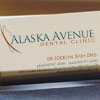In the past, a tooth with nerve damage would typically need to be pulled. These days, our Fort St. John dentists can perform a root canal procedure to help save a tooth with minimal time and discomfort.
What is a root canal?
A root canal (also known as endodontic treatment) is a safe and effective dental procedure during which a dentist removes damaged pulp from the interior of the tooth, preventing the need for a tooth extraction.
Once a tooth has emerged through the gums, the nerve's only function is to provide the sensation of hot or cold temperatures, so the absence of the nerve will not affect the function of the tooth, and it's better to remove it.
What happens during a root canal procedure?
Root canal treatments usually involve one to three visits to your dental office, depending on how severe the damage is.
First, the dentist removes the affected tissue and cleans the interior of the tooth. The tooth is then sealed and filled with a composite material. If your tooth had extensive decay, your dentist may place a dental crown to strengthen and protect the tooth.
Why is my dentist recommending I have a root canal?
When a tooth has a deep cavity or is cracked, bacteria can enter the interior of the tooth and cause infection. If left untreated, an abscess may form, pain and swelling may result, and it may eventually cause damage to your jawbones and overall oral health.
In these cases, the solution is often to remove the infected tooth nerve with a root canal.
How do I know if I need a root canal?
Patients generally need a root canal when they experience a severe toothache, swelling in the gums, or tooth sensitivity, especially to hot and cold. These symptoms can be easily remedied when the damaged tissue is removed.
Only your dentist can determine if a root canal will be an appropriate treatment. If you experience any of these symptoms, be sure to contact your dentist.
Does having a root canal hurt?
Since patients are given anesthesia, a root canal isn’t more painful than other dental procedures, like getting a filling or having a wisdom tooth removed.
You may experience some soreness or numbness after the procedure, and you may experience mild discomfort for a few days. But your dentist can help with pain management, and in most cases, any post-procedure pain can be treated quickly and comfortably.
How can I prevent needing a root canal?
To prevent the need for a root canal, it’s important to follow the same dental hygiene habits that help prevent cavities and other tooth problems. At Alaska Avenue Dental Clinic we believe that the best way to keep your teeth healthy is to follow these guidelines:
- Brush your teeth at least twice a day
- Floss between each tooth at least once a day
- Use fluoride toothpaste or a fluoride rinse
- Visit your dentist for checkups every six months
- Have your teeth professionally cleaned by your dentist at least once per year
- Try to limit the amount of sugary food and refined carbohydrates you eat. These foods have a tendency to stick to your teeth. If you eat sugary foods, try to rinse your mouth or brush your teeth shortly afterward

